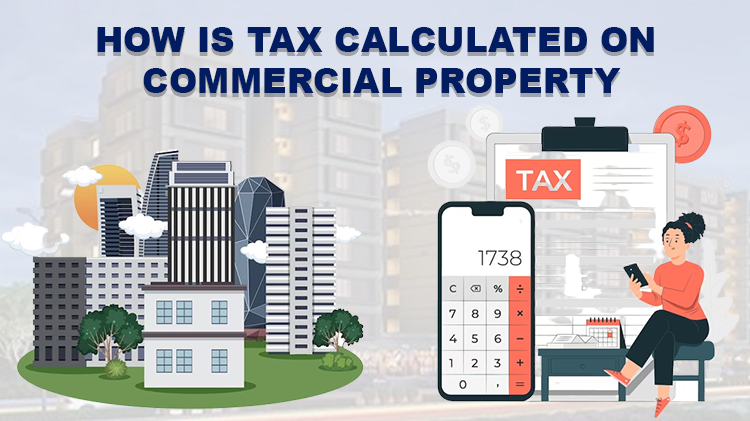Table of Contents
Every taxpayer in India has a responsibility to pay taxes because they are utilised to fund development. The tax is imposed on a variety of items, including commodities, services, and even real estate. The Income Tax Authority of India offers its people the choice of paying taxes in person or online in order to make the process as simple as possible. The property tax is divided into residential and commercial property taxes in order to be paid in accordance with the appropriate provision. The Income Tax Department’s web and its offline payment options are both available for both taxes.
Another significant tax that must be paid by the taxpayer within the allotted time is the commercial property tax. Let’s go over the definition of the business property tax, payment options, and other details.
What is Commercial Property Tax?
The term “commercial property tax” refers to the tax imposed on real estate used for commercial purposes and paid by the owner to local government entities, such as the municipality. It includes both a person’s personal assets and any real estate they own or lease to others for the purpose of running a business, commercial venture, or industry.
Taxes on commercial real estate in India are based on “real property.” Municipalities use the money they get from these taxes to pay for the building of roads, schools, and other public facilities.
Commercial Property Goods and Services Tax (GST)
When a property is rented out as a commercial property and generates an annual revenue of 20 lakhs or more, GST will be automatically applied to that property. In this case, GST (Goods and Services Tax) will need to be paid at a rate of around 18% of the entire annual income.
How to Calculate Commercial Property Tax?
The procedures for calculating the commercial property tax vary by state and municipality. Therefore, it is preferable to consult all of the states’ or municipalities’ websites before performing the computations. Instead, consider the following advice to better understand how the government determines the commercial property tax. The following criteria are used to calculate the tax:
- The area where the property is situated.
- The use of the property (self-occupied, rented, or vacant).
- The utilisation of that property for business.
- There are amenities on the property, including a store, parking, etc.
- The type of building (multi- or single-story).
- The age of the land’s construction.
- The floor space index.
- The property’s carpeted areas.
All commercial property tax calculations are based on the aforementioned variables. The following techniques could be used by municipalities to determine the commercial property tax:
Unit Area Value System
This method of calculating commercial property taxes specifies the build-up area or carpet area per unit area for the calculations. The expected returns are determined in light of the outcome. The commercial property tax is then computed using the anticipated returns.
Capital-Value Based System
The market value of the property for commercial use is a significant contributing aspect in this computation approach. The market value of the property will first be determined by the local government based on its kind and surroundings. Each year, this property’s rate. The commercial property tax is then computed using the property’s market value.
Annual Rental Value System
With this method, the tax is calculated based on the potential rental income that landlords could generate. We calculate the tax based on the rental income you would receive from the property. To assess the property’s tax value, the authorities will take into account its location, characteristics, and size.
Every municipal authority in India chooses one of these three methods to determine how to calculate commercial property taxes. Using an online commercial property calculator for your particular municipality, you may easily ascertain the amount of commercial tax you must pay on the property. The majority of real estate will, however, be subject to a tax system that is relatively similar to the standard property tax.
Steps for Commercial Property Tax Payment
The commercial property tax can be paid in two different ways: online and offline. The steps for both methods of paying the commercial property tax are listed below.
How to Pay Commercial Property Tax Online
The actions listed below should be followed in order to pay the commercial property tax online.
- Step 1: is to go to the official website of the municipality where the property is listed.
- Step 2: Select the ‘Payment’ tab from the webpage, then follow the portal’s instructions.
- Step 3: Select the appropriate form that will result in the payment of commercial property taxes. According to the property tax, the form is either Form 4 or 5. Additionally, whether or not the property in issue has undergone any changes is determined by the documents that are supplied with the form.
- Step 4: After choosing the assessment year, make sure that any outstanding payments for commercial property taxes have been made. The majority of municipal corporation websites enable taxpayers to pay any back taxes owed before processing the payment for the current year’s commercial property taxes.
- Step 5: Enter the property’s information, including its address, district, etc., and identification number, in the following section. Attach the necessary supporting documentation to the form to demonstrate the updates and verifications.
- Step 6: Go to the section for paying commercial property taxes after entering all the information about the property and clicking the “Submit” button.
- Step 7: Complete the business property tax payment to pay off all outstanding debt using the payment method of your choice.
- Step 8: The business property tax payment receipt or challan will be shown after the payment has been made. Save the challan on your computer for later use.
Offline Steps to Pay Commercial Property Tax
You can pay your commercial property tax via the offline payment method by following the procedures below if the online payment option is not accessible to you.
- Step 1: is to go to the municipal corporation’s office that is the closest to you.
- Step 2: Bring all the necessary paperwork and information about the property.
- Step 3: Approach the counter and request the form for paying the business property tax.
- Step 4: Complete the form completely with all the necessary details, and then attach the appropriate papers.
- Step 5: Finish making your payment at the designated counter.
- Step 6: Submit the form, and the agent will offer you a receipt for your payment.
What are the taxes applicable on commercial property?
Many people consult an expert because they want to know the finest business property tax procedure. In general, starting with the AY 22-23, a renter must deduct income tax at source at a rate of 10% when the rent for a property exceeds Rs. 2.40 lakh annually. Simply put, both commercial and residential buildings are subject to the TDS. TDS won’t be subject to GST.
Commercial Property that You Use for your Own Profession
You should be fully informed on rental revenue from business property as it relates to income tax. Let’s say you use any commercial property either entirely or in part for business or professional purposes. Then, the portion of any such properties utilised for this purpose that belongs to you won’t be subject to personal taxation. However, you cannot deduct any form of (notional) rent for such properties from your business’s income. Consider seeking the advice of a professional to learn more about the deductions under income from business and profession. On the other hand, you will be able to deduct property maintenance and repair costs from your business income. Total interest may be written off as a business expense, minus any limitations.
Although you should have all the necessary documentation and make sure it is submitted properly, paying taxes properly is essential. Beginners should never attempt this without professional assistance. You should be aware that, for loans on commercial units, there is no Section 80C deduction available for principal repayment. Keep an eye on the documents if you’re interested in learning more about income tax on rental revenue from commercial property in India.
Investing in Commercial Property through REIT
You must keep in mind that there are many chances you won’t find the right real estate agent on the market. So, asking for references from other homeowners may help you solve a particular problem. Additionally, there are a few advantages of human-to-human choosing.
Additionally, acquiring the correct realtor in this situation requires a recommendation from other homeowners. Selling commercial real estate is generally not a simple task, but if you want to do it correctly, be sure to learn the specifics of tax payment.
You must ensure that you choose the appropriate form of advice when deciding how to sell a commercial property. Additionally, you must be aware that you take the budget and the top professionals into account. Many people are interested in learning more about business taxes. Since the GST is levied on both imported and domestically manufactured goods, a mention of it will do.
Taxation of Profits on the Sale of Commercial Property
You must make sure that you are familiar with the tax documentation before you acquire or sell any commercial real estate. By seeking assistance from a tax-paying professional, you can complete business renters pay property tax.
This provides the summary of the tutorial that explains how to choose the best realtor. You can continue researching if you want to learn more about the tricks and hacks for finding the realtor. Otherwise, keep checking back here for additional guides of this nature. Nowadays, you must make sure that you are aware of the details before paying the commercial rent tax in India. You can get professional help – Country Roof with the business tax
How to Acquire Commercial Property Tax Challan?
After paying your business property tax in full, either offline or online, you must obtain a tax payment receipt as a taxpayer. If the payment is done via the online option, the receipt will automatically be downloaded. You must take the tax receipt from the counter if the payment was done offline.
Conclusion
The commercial property tax is comparable to other taxes on real estate that are imposed in India. The municipality in which the tax may, however, be applicable varies occasionally. Because last-minute calculations can cause problems, it is imperative to calculate the business property tax in preparation.
Check: Top Commercial Property In Gurugram
FAQs
1. How is tax on commercial property determined?
Normally, the assessed value of commercial property and the corresponding tax rate are used to determine the tax due.
2. What is a commercial property’s assessed value?
A local government organisation, such the assessor’s office, will calculate the assessed value, which is an estimation of the property’s market value.
3. Where does the assessed value come from?
Depending on the jurisdiction, other approaches, such as the sales comparison technique, the income approach, and the cost approach, can be used to calculate the assessed value.
4. What is the tax rate on properties used for business?
The location and regional tax regulations influence the tax rate for commercial properties. The most common way to express it is as a percentage of the assessed value.
5. Based on the assessed value and tax rate, how is the tax determined?
The assessed value of the commercial property is multiplied by the tax rate to determine the tax. The resulting sum is the yearly tax obligation.
6. Do commercial property taxes have any exemptions or deductions?
Yes, certain jurisdictions might provide commercial property exemptions or deductions, such as for historical structures, nonprofits, or particular kinds of businesses. The taxable value or the tax rate that is imposed may be decreased by these exemptions or deductions.
7. How frequently are the taxes on commercial real estate are assessed?
Depending on the jurisdiction, the frequency of property tax assessments can change. Assessments may take performed annually in certain regions or just seldom in others.
8. Can a commercial property’s assessed value alter over time?
Yes, due to things like market conditions, property upgrades, or reassessments carried out by the local government, the assessed value of a commercial property may alter over time.
9. If property owners feel the assessed value is excessive, can they challenge it?
Yes, in most cases, property owners have the option to contest the assessed value if they think it is unjust or erroneous. They might offer proof to back up their assertion and ask for a re-evaluation.
10. What happens if a landlord of a business property doesn’t pay their property taxes?
In order to recoup unpaid property taxes, the local government may file a lawsuit, impose fines and interest, or even begin a tax foreclosure process.
11. Are various commercial property types subject to differing property tax assessments?
Yes, depending on the property’s size, location, usage, and zoning laws, different commercial property kinds may have variable tax assessments.
12. Do leased commercial premises require any special attention?
In some circumstances, the lease agreement may specify who is responsible for paying the property taxes. It’s critical for landlords and tenants to be aware of their separate responsibilities for paying property taxes.
13. Can commercial property taxes be written off as a business expense?
Commercial property tax payments are typically deductible as a business expense for income tax purposes in many jurisdictions. To grasp the precise guidelines and laws in, it is suggested to speak with a tax expert.
14. Can the amount of property taxes vary from year to year?
Yes, property tax rates might vary from year to year depending on a variety of reasons, such as budgetary requirements, modifications to local tax laws, or tax levies that have received voter approval.
15. Are there any tools available to help property owners comprehend their tax requirements for commercial property?
Websites of the local government, tax assessor’s offices, or qualified tax consultants can offer helpful information and direction on comprehending commercial property tax requirements.
16. Do cities and counties have different property tax rates?
In the same jurisdiction, property tax rates can range between different cities and counties. Within the confines of a state or regional regulatory framework, each local government determines its own tax rates.




